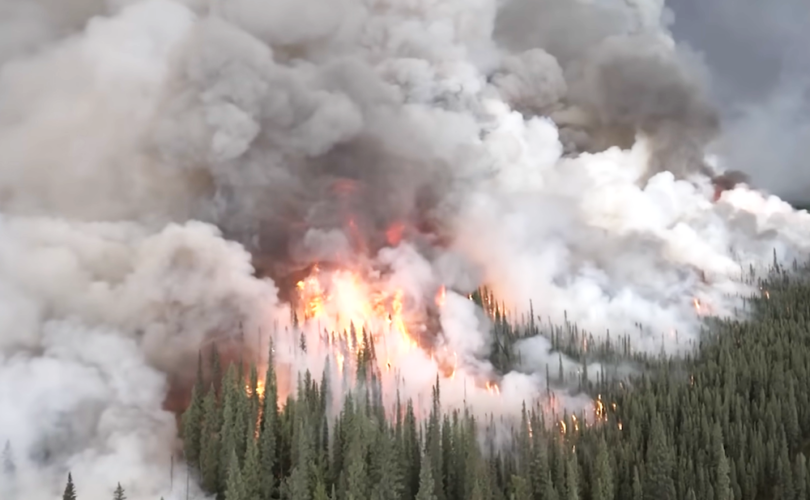Tell Canadian politicians not repeat Alberta’s energy nightmare – send a message now
CHAPAIS, Quebec (LifeSiteNews) — A Quebec man has admitted to starting 14 forest fires, putting another dent in the mainstream media’s narrative that Canadian wildfires are being caused by “climate change.”
On January 15, Brian Paré, 38, pleaded guilty to 13 counts of arson and one count of arson with disregard for human life for lighting fires last spring which had caused the evacuation of around 500 homes in the small-town of Chapais, Quebec.
“On May 31 at 8:30 p.m., the town of Chapais issued a mandatory evacuation order due to the raging fires, in particular the fire at Lake Cavan as well as the airport fire, two fires that are included in the charges and were cause by the accused,” Prosecutor Marie-Philippe Charron told the court.
This was the largest fire which Paré ignited, burning nearly 873 hectares of forest. It also began a series of fires which Paré started between May 31 and June 1.
Paré’s guilty plea comes after the mainstream media and government ran with the dubious claim that the forest fires experienced in Canada were largely driven by “climate change.”
While reporting on Paré’s case, legacy media outlets have focused on his Facebook posts in which he claimed that fires were being deliberately set to trick Canadians’ into believing in climate change. Interestingly, the media has yet to report on satellite footage from June 2 of last year which appears to show the mysterious simultaneous eruption of several blazes across Quebec.
Moreover, the Quebec fires are not the only outbreaks to have suspicious origins. The Royal Canadian Mounted Police (RCMP) have arrested and charged several suspected arsonists in a number of provinces including Nova Scotia, Yukon, British Columbia, and Alberta.
Furthermore, Alberta Premier Danielle Smith revealed that 500 of the 650 fires in Alberta were started by humans. The motive behind lighting the fires is unclear, but they have all taken place in the same time period.
Despite the suspicious nature of many of the fires, outlets like the Canadian Broadcasting Corporation (CBC), which gets 70 percent of its operating budget via tax dollars from the federal government, has ran with headlines such as, “Rise in extreme wildfires linked directly to emissions from oil companies in new study.”
“Canadian forest fires are the latest costly climate disaster that public accounts fail to capture,” another CBC headline read.
“Climate change is increasing the risks of wildfires in the country, experts say,” Global News, another government-subsidized outlet, attested at the time.
The story was also taken up by Prime Minister Justin Trudeau, who told Canadians in June, “We’re seeing more and more of these fires because of climate change.”
“These fires are affecting everyday routines, lives and livelihoods, and our air quality,” he added. “We’ll keep working – here at home and with partners around the world – to tackle climate change and address its impacts.”
Notably, the government-funded mainstream media outlets attributing the increase of wildfires to “climate change” are doing so at the same time the Liberal government of Prime Minister Justin Trudeau actively pushes for increased bans on using natural resources in Canada to combat “climate change.”
The reduction and eventual elimination of the use of so-called “fossil fuels” and a transition to unreliable “green” energy has also been pushed by the World Economic Forum (WEF) – the globalist group behind the socialist “Great Reset” agenda – an organization with which Trudeau and some in his cabinet are involved.
While Trudeau’s plan has been pushed under the guise of “sustainability,” his intention to decrease nitrous oxide emissions by limiting the use of fertilizer has been criticized by farmers. They say this will reduce profits and could even lead to food shortages.
Moreover, experts are warning that the Trudeau government’s new “clean fuel” regulations, which come into effect next year, will cost Canadian workers – many of whom are already struggling under decades-high inflation rates – an average $1,277 extra annually.
Tell Canadian politicians not repeat Alberta’s energy nightmare – send a message now

